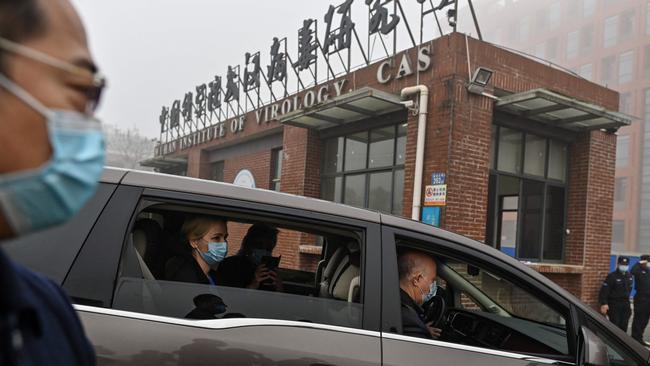Xi Jinping plays politics in brazen bid to pin Covid-19 on US
Beijing’s disinformation campaign has gone into overdrive ahead of the release of a report by US intelligence agencies into the origins of Covid-19.

It was absurd behaviour – even for a Chinese wolf warrior.
President Xi Jinping’s envoy in Geneva has demanded the World Health Organisation investigate America’s Fort Detrick military lab in the next phase of the study of the origins of Covid-19.
Chinese envoy Chen Xu made the brazen request in a letter sent on Tuesday night to WHO director-general Tedros Adhanom Ghebreyesus.
“It is the first time that China formally asked the WHO through diplomatic channels to conduct a probe on virus origins to Fort Detrick,” reported the Global Times, a jingoistic Communist Party-serving tabloid.
Beijing’s disinformation campaign has gone into overdrive. Politics has completely subsumed science ahead of the release of a report US President Joe Biden asked his intelligence agencies to prepare on the origins of Covid-19.
“It doesn’t make sense that it came out of Fort Detrick,” said Dominic Dwyer, the Australian member of the joint WHO-convened study of Covid’s origins.
“If they have evidence for that, from their own intelligence services, great, let’s go ahead and look at that as well. But there isn’t any,” professor Dwyer told The Australian.
The Chinese Communist Party’s information war is being waged with spectacular hypocrisy.
China’s political officials demand the study of the coronavirus must not be politicised – despite doing exactly that since the coronavirus was first detected in Wuhan in late 2019.
Peter Ben Embarek, the leader of the WHO team that visited China earlier this year, has spoken openly about that. “The politics was always in the room with us,” Dr Ben Embarek said.
It was hard enough before Mr Xi came to power.
Back in 2003, a team of WHO experts visited Beijing to investigate the SARS coronavirus outbreak.
Party officials allowed the WHO team to inspect a Beijing hospital but only after they had, minutes earlier, hidden all medical staff infected with SARS in ambulances and whisked them away.
“Inside the vehicles was a deadly secret: 31 coughing, shivering hospital workers who had caught SARS from their patients,” wrote Karl Taro Greenfeld in China Syndrome, a haunting account of the 21st century’s first great epidemic.
That cover-up was only revealed because of the incredibly brave Jiang Yanyong, a doctor and member of the Party. Dr Jiang Yanyong, now 89-years-old, was put under house arrest for harming “the interests of the nation”.
Things are even more constrained during the 21st century’s first great pandemic.
The WHO team was, in late January, finally allowed access to the Wuhan market linked to most of the early cases. Chinese officials told them no live animals were seen at the market before it was closed.
The officials also provided access to vetted Wuhan residents, who were said to be regular shoppers at the market. They claimed they “had never witnessed any live animals being sold”.
Data collected by a Chinese virologist, Xiao Xiao, published months later, revealed the WHO-team had been seriously misled. Animal logs compiled by Dr Xiao document at least 38 live animals traded there.
They included at least five species susceptible to coronavirus infections: raccoon dogs, masked palm civets, bamboo rats, minks, and hog badgers.
“It seems to me, at a minimum, that local or regional authorities kept that information quiet deliberately,” Stephen Goldstein, an evolutionary virology researcher at the University of Utah, told Bloomberg.
“It’s incredible to me that people theorise about one type of cover-up, but an obvious cover-up is staring them right in the face.”
The Chinese government has a huge credibility problem on all this. Its insistence that no further investigation of Wuhan’s laboratories will be allowed unless the US opens the doors to Fort Detrick only heightens interest in them.
But without Beijing’s co-operation, further studies of anything in China are impossible.
How do you conduct politically sensitive research in a Leninist party state? It is a dilemma the WHO will struggle to resolve.




To join the conversation, please log in. Don't have an account? Register
Join the conversation, you are commenting as Logout